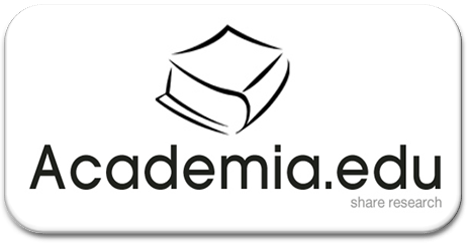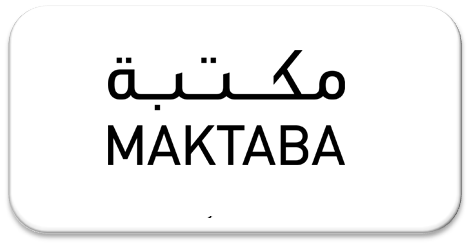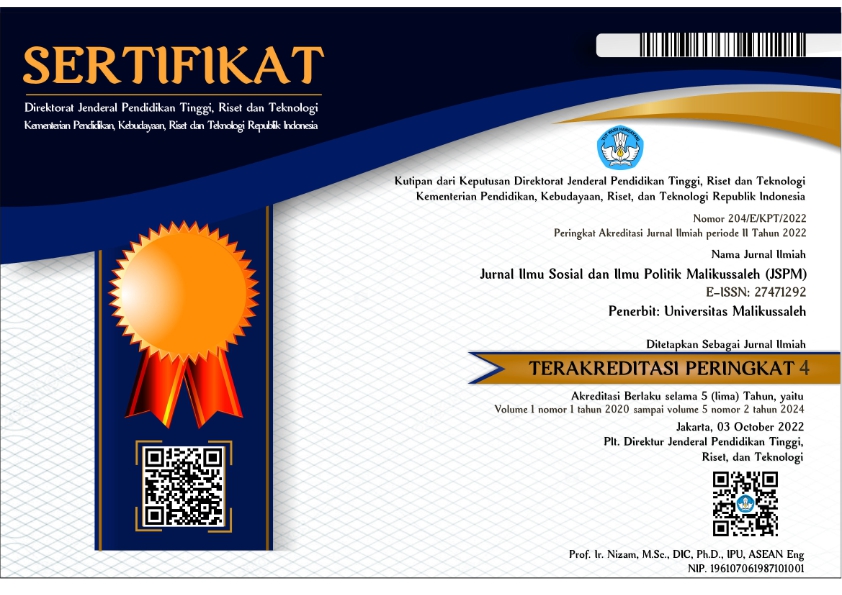Shaping the Future of Politics: Transforming Legislative Candidate Campaigns Through Social Media
Abstract
One of the changes in political communication strategies is caused by technological changes. Social media is one of the political communication channels for women legislative candidates in conducting their political campaigns in the 2024 legislative elections. This research aims to reveal how the use of social media in the campaign strategy of female legislative candidates in the digital era? What are the benefits obtained by legislative candidates who effectively use social media in their political campaigns. The approach used in this research is descriptive qualitative while the natural informants of this research are female legislative candidates from local SIRA Party, Democratic Party and PDI-P Party who are in electoral district 1 (Dapil 1) for Aceh Besar, Banda Aceh and Sabang. The results of the study found that the use of social media in campaign strategies for female legislative candidates in the digital era, that social media is a medium for developing the image and branding of female candidates, the presence of social media makes it easy for candidates to communicate directly with voters, become a channel for discussing matters related to gender issues and become a means to gain women's support. The advantages felt by female legislative candidates in using social media for their political campaigns are; social media's ability to reach a wide audience, the ability to interact with the public, and the ability to communicate with the public.
Keywords
Full Text:
PDFReferences
Alam, S. (2021). Penggunaan Media Sosial Sebagai Alat Komunikasi Politik. Avant Garde. https://doi.org/10.36080/ag.v9i1.1257
Alfiyani, N. (2018). Media Sosial Sebagai Strategi Komunikasi Politik. Potret Pemikiran, 22(1). https://doi.org/10.30984/pp.v22i1.762
Anang Sugeng Cahyono. (2020). PENGARUH MEDIA SOSIALTERHADAP PERUBAHAN SOSIALMASYARAKAT DI INDONESIA. Publiciana., 5(2), 202–225. https://doi.org/https://doi.org/10.36563/publiciana.v9i1.79
Anshari, F. (2013). Komunikasi Politik di Era Media Sosial Faridhian Anshari Staff Pengajar STT PLN Jakarta. Jurnal Komunikasi, 8(1), 91–101.
Arifin, A. (2014). Politik Pencitraan-Pencitraan Politik. Graha Ilmu.
Berliani Ardha. (2014). Social Media Sebagai Media Kampanye Partai Politik 2014 Di Indonesia. Jurnal Visi Komunikasi, 13(01), 105–120.
Budiyono. (2015). Fenomena Komunikasi Politik dalam Media Sosial Political Communication Phenomenon in Social Media. Fenomena Komunikasi Politik Dalam Media Sosial Political Communication Phenomenon in Social Media, 17(2), 143-.
Cangara, H. (2009). Komunikasi Politik: Konsep,Teori dan Strategi. PT Raja grafindo Persada.
Guntur, M., Kusen, A. W. S., & Pratiknjo, M. H. (2019). Keterlibatan Perempuan Dalam Lembaga Legislatif Tahun 2014-2019 (Studi Kasus Kabupaten Halmahera Utara). Holistik, 11(21), 1–16.
Haboddin, M. (2016). No Title. Jurnal Transformative, 2(1), 16–28.
Hasan, K. (2009). Komunikasi Politik dan Pecitraan. Jurnal Ilmiah Dinamika, 2(4), 22–43.
Ichwanuddin, W. (2014). Konsep Perwakilan Politik. Legislatif Indonesia, 1–25.
Irawatiningrum, S. (2020). Personal Branding Caleg Melalui Media Sosial. Lingkar Studi Komunikasi (LISKI), 6(Vol 6 No 2 (2020): SEPTEMBER 2020), 107–115.
Moekahar, F., Ayuningtyas, F., & Hardianti, F. (2022). Social media political campaign model of local elections in Pelalawan Regency Riau. Jurnal Kajian Komunikasi, 10(2), 242. https://doi.org/10.24198/jkk.v10i2.41680
Mukarom zainal. (2016). ZM_Komunikasi_Politik.pdf. CV. PUSTAKA SETIA.
Munzir, A. A. (2019). Beragam Peran Media Sosial dalam Dunia Politik di Indonesia. JPPUMA Jurnal Ilmu Pemerintahan Dan Sosial Politik Universitas Medan Area, 7(2), 173. https://doi.org/10.31289/jppuma.v7i2.2691
Nazaruddin, M., Nirzalin, N., Kamil, A. I., Nasution, A. A., & Yunanda, R. (2021). WALI NANGGROE ACEH: Transformasi, Eksistensi dan Model Penguatan Kelembagaan. Jurnal Ilmu Sosial Dan Ilmu Politik Malikussaleh (JSPM), 2(2), 238–255.
Norris, P. (2001). Digital Divide: Civic Engagement, Information Poverty and the Internet World-Wide. In Info - The journal of policy, regulation and strategy for telecommunications (Vol. 5). https://doi.org/10.1108/146366903322008287
Putri, R. E. (2015). KOMUNIKASI POLITIK (Model Komunikasi Politik Antar Fraksi dalam Pembentukan Norma UU Pilkada Secara Demokratis). Jurisprudence, 5(1), 50–63.
Salman Farid, A. (2023). Penggunaan Media Sosial Dalam Kampanye Politik Dan Dampaknya Terhadap Partisipasi Politik Dan Persepsi Publik. QAULAN: Jurnal Komunikasi Dan Penyiaran Islam, 4(1), 45–50.
Slamet, A. (2011). Pengertian dan Model Komunikasi Politik. Teaching Resource.
Sudirman, S. (2023). Proses Negosiasi Partai Aceh Dan Upaya Penerimaan Pilkada Aceh Tahun 2012. Universitas Nasional.
DOI: https://doi.org/10.29103/jspm.v5i2.14937
 Article Metrics
Article Metrics
 Abstract Views : 210 times
Abstract Views : 210 times
Refbacks
- There are currently no refbacks.
Copyright (c) 2024 ainol mardhiah, Cindenia Puspasari, Anismar anismar, ade muana husniati, Arinanda arinanda

This work is licensed under a Creative Commons Attribution-ShareAlike 4.0 International License.
INDEXED BY:




.png)









Redaksi Jurnal Ilmu Sosial dan Ilmu Politik Malikussaleh (JSPM): Gedung Fakultas Ilmu Sosial dan Ilmu Politik Universitas Malikussaleh. Kampus Bukit Indah Jln. Sumatera No.8, Kec. Muara Satu Kota Lhokseumawe, Prov. Aceh, Indonesia. eMail: jspm@unimal.ac.id

This work is licensed under a Creative Commons Attribution-NonCommercial-ShareAlike 4.0 International License



.png)



